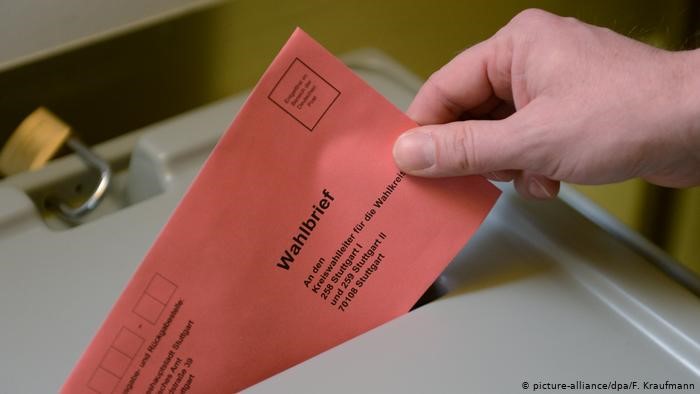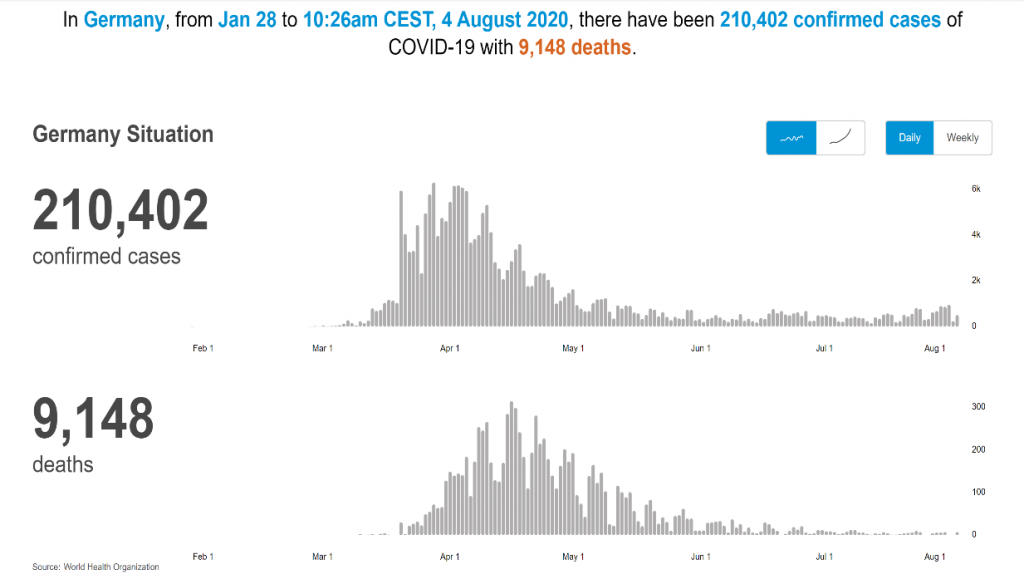With COVID-19’s devastating impact on countries around the world, Germany’s reaction to the pandemic has had the unfortunate result of displacing democratic principles.
Germany: From Nazi to Democracy
Germany is the quintessential comeback kid—overcoming arguably the most despicable dictatorship in history to become a fledgling democracy. Fast forward to today– Germany is a robust democracy that is currently facing a serious challenge to those democratic values it fought so hard to attain. Patrick Bernhagen in Democratization gives examples of qualities represented in democracies, and Germany has made great strides to embrace those qualities. Dahl’s perspective of the necessities of a democracy, include “Free and fair elections, Freedom of expression, Associational autonomy, etc.” (Bernhagen, 29).

With COVID-19’s devastating impact on countries around the world, Germany’s reaction to the pandemic has had the unfortunate result of displacing democratic principles. While Germany has been able to keep their death rate to COVID-19 low, it has restricted civil liberties in its effort to do so. Germany’s history creates a unique sensitivity to maintaining hard fought democracy for its citizens. Countries around the world face myriad issues in response to the COVID-19 pandemic, and Germany is no exception. Pre-pandemic, Germany received a high democratic rating according to the assessment of Freedom House. How much of a hit has their civil liberties taken during COVID-19? The answer is disturbing.
Democracy Interrupted: COVID-19
Authoritarian regimes have seen successful short-term success regarding the containment of COVID-19. Their citizens are conditioned to accept the dictates of their government. Democracies are challenged to preserve the freedoms of its citizens while contemporaneously fighting to tamp down the negative impact of the virus. Germany’s emergency powers do not extend to matters including pandemics but address natural disasters and uprising of wars. This express limitation was the direct consequence of the country’s history. Therefore, Chancellor Merkel utilized an existing the Infectious Diseases Protection Act to significantly expand the executive powers of the state during the pandemic (Stelzenmuller, 2020).

A news article from a German broadcaster, Deutsche Welle, notes changes that many European states are taking to combat COVID-19, “the rapid spread of the virus also forces democratic states to take emergency measures that were otherwise known from authoritarian systems: curfews, assembly bans and cuts in religious freedom, for example.” (Hanel, 2020). Germany has reverted to these authoritarian precepts. A general ban on assemblies, including non-violent protests has been imposed. In fact, Germany does not allow any gathering of more than two people (Bennhold and Eddy, 2020). The biggest state in Germany, Bavaria, has imposed curfews (Rinke and Busvine, 2020). Those who break these new rules face arrest by police. It must be very troubling for those who lived during the Nazi regime to see the actions the government is taking today.
Due to Germany’s robust health care system and high level of testing, the COVID-19 death rate has been low compared to other countries (Seervai, 2020). But at what cost? Germany faces a difficult balancing act, avoiding repetition of a Weimar Republic emergency decree while keeping its people from dying of COVID-19. What is clear is that even strong democracies take measures during a time of emergency and based in necessity which curtail democratic ideals. These variations to the norm create challenging decisions for countries attempting to govern in the time of COVID-19, and in the case of Germany, those decisions are fraught with the weight of its own history.
Cole Montefusco is a senior at SUNY Geneseo, majoring in Political Science with a May 2021 graduation date.
Bibliography
Bennhold, Katrin and Eddy, Melissa. “Germany Bans Groups of More Than 2 to Stop Coronavirus as Merkel Self-Isolates”, TheNewYorkTimes, March 22, 2020. https://www.nytimes.com/2020/03/22/world/europe/germany-coronavirus-budget.html
Bernhagen, Patrick. “Measuring Democracy and Democratization”, Democratization, page 29.
“Coronavirus affects election turnout in France, Bavaria”, DW, March 15, 2020. https://www.dw.com/en/coronavirus-affects-election-turnout-in-france-bavaria/a-52787502
“Germany: WHO Coronavirus Disease”, WorldHealthOrganization, August 4, 2020. https://covid19.who.int/region/euro/country/de
Hanel, Lisa. “Coronavirus: A stress test for democracy”, DW, August 4, 2020. https://www.dw.com/en/coronavirus-a-stress-test-for-democracy/a-53064455
Rinke, Andreas and Busvine, Douglas. “Germans warned: Keep your distance or face a curfew”, Reuters, March 20, 2020. https://www.reuters.com/article/us-health-coronavirus-germany/germans-warned-keep-your-distance-or-face-a-curfew-idUSKBN21716B
Seervai, Shanoor. “How Germany’s Approach to COVID-19 Sets the Country Apart”, TheCommonwealthFund, May 1, 2020. https://www.commonwealthfund.org/publications/podcast/2020/may/how-germanys-approach-covid-19-sets-country-apart
Stelzenmuller, Constanze. “Coronavirus is also a threat to democratic constitutions”, Brookings, April 15, 2020. https://www.brookings.edu/blog/order-from-chaos/2020/04/15/coronavirus-is-also-a-threat-to-democratic-constitutions/
